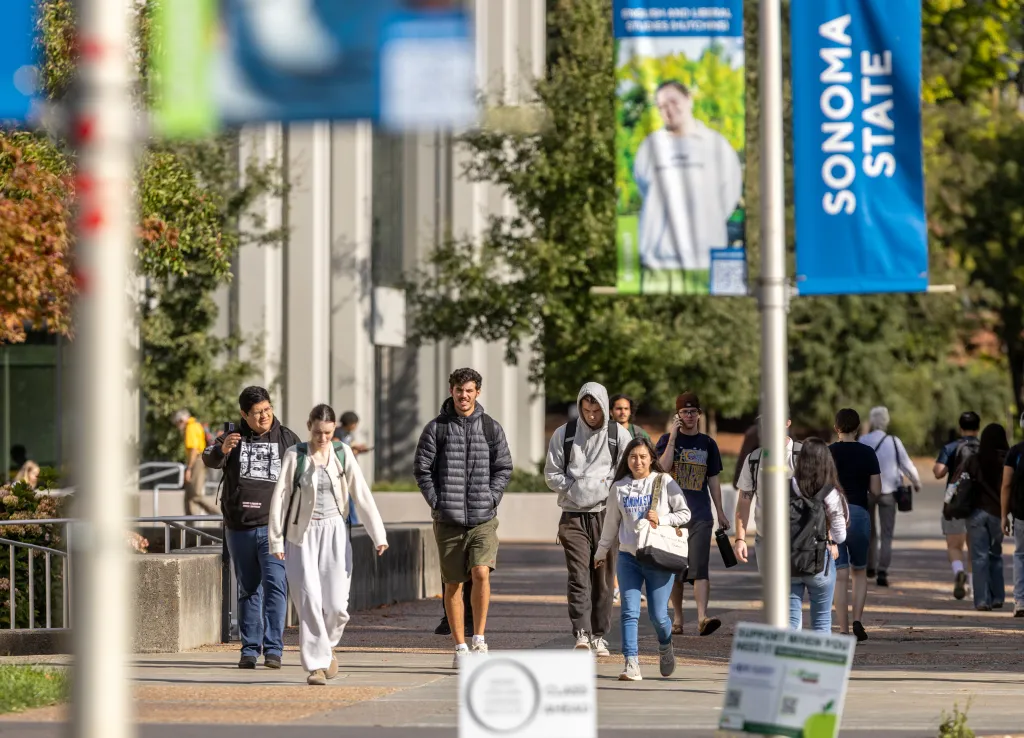Trump administration cuts teacher training program, curtailing $3.2 million grant for Sonoma State

A federal grant that helped Sonoma State University students earn their teaching credentials has been terminated by the Trump administration’s Department of Education.
The EDUCA grant, $3.2 million over five years for SSU, was funded by the Hawkins Program, and designed to increase and retain the number of teachers from diverse backgrounds. It provided aspiring educators up to $12,000 a year to defray the costs of tuition, food and shelter.
Approved by the previous administration, it was cancelled by Trump’s education officials after a single year.
The financial assistance had allowed SSU’s educators-in-training to participate in full-immersion residency programs at high schools throughout the North Bay – without needing to then work weekends and evenings for their livelihoods.
This semester, Sonoma State has partnered with 10 different districts to place 81 teacher residents in 22 high schools, from Vallejo to the south to Covelo in the north. Those candidates are being trained in communities where they will eventually be employed, in locations experiencing teacher shortages, said Laura Alamillo, dean of Sonoma State’s College of Education, Counseling and Ethnic Studies,
The latest cut comes on the heels of the news in September that the Trump administration was revoking grant-funded programs targeted for Hispanic Serving Institutions, impacting nearly 170 campuses statewide. At SSU, that move will shutter the PUERTA initiative, which last year had been awarded nearly $3 million over five years to increase the number of Hispanic students in pre-professional health, nursing and teaching pathways.
While this most recent cancellation took effect Sept. 30, Sonoma State has informed students losing their scholarships that it will replace the retracted EDUCA funds, through the end of the spring semester.
“We don’t want people to drop out halfway through the program,” said Rhianna Casesa, professor in the department of literacy studies and elementary education.
The grant had been designed to address California’s chronic shortage of teachers, especially in the areas of math, science, special education and bilingual education — and to increase the numbers of low-income and minority students in the ranks of California teachers.
Studies have shown that “diversification of the work force is good for kids of color,” said Casesa. Such students “need to see themselves in their teachers, to have teachers who’ve had similar life experiences – like, maybe they understand what it’s like to be from a migrant family, or to live in multi-generational household, or just with your abuelos when your parents are still in Mexico.”
Many of the students in residency who are minorities, she added, “say that they have never had a teacher that looked like them. So they want to be the teacher they never had.”
Added diversity in the teaching pool is also good for white kids, she noted, who benefit from being exposed to a diversity of experiences, language and culture.
But it was the EDUCA grant’s focus on equity and diversity that snagged the attention of staffers in the Trump administration.
Such policies “violate the letter or purpose of Federal civil rights law” and “undermine the well-being of the students these programs are intended to help,” wrote Lindsey Burke in her memo to Sonoma State announcing the program’s cancellation.
Burke, the Department of Education’s deputy chief of staff for policy and programs, was the lead author of the education section in Project 2025, the controversial blueprint for Trump’s second term issued by the Heritage Foundation, where she was an executive.
SSU representatives aren’t backing down in their public defense of the teacher training initiative. Research has shown that the resident pathway offered by this Sonoma State program “is the most effective way to prepare new teachers,” Casesa said.
The prospective educators are put in a classroom, under the tutelage of a “mentor teacher,” for an entire academic year. “So they have this really extended clinical practice.”
Alicia Robert enrolled in Sonoma State’s teacher residency program after losing her job during the Covid-19 pandemic. Unlike aspiring teachers on a more traditional pathway, putting in 10 classroom hours a week, the residency program “allowed us to be there all the time, so we really got to know the kids, and the classroom.”
Roberts’ put in her residency during the 2021-’22 school year at her alma mater, Napa High School. Upon earning her math teaching credential, she was swiftly hired by American Canyon High School, where she now teaches math.
Sarah Femmel worked five years in the private sector after graduating from Humboldt State, where she majored in marine biology and minored in chemistry.
While recovering from shoulder surgery, she’d worked in an elementary school as a paired professional, found it fulfilling, and decided to become a teacher. After signing up at SSU to be a teacher resident, she was assigned to Elsie Allen High School, where she had a pair of mentor teachers.
SSU students who become residents agree to spend five years teaching in that district, if needed. Thus does the program address another chronic issue plaguing the profession: teacher retention.
But Santa Rosa City Schools had no secondary teaching job to offer Femmel after she earned her credential. No problem: she was snapped up by San Marin High School in Novato, where she now teaches chemistry.
“The department I work in is amazing,” said Femmel, who also has a credential to teach biology. “I can’t imagine working anywhere else.”
The news that the EDUCA scholarships are being cut “was a little bit shocking,” she said.
“To become a teacher, you really have to reflect on what you’re doing, and what you’re learning.” That immersion simply isn’t possible, she said, “when you have to work a part time in the evening to pay the bills.”
You can reach Staff Writer Austin Murphy at 707-521-5214 or austin.murphy@pressdemocrat.com. On X @ausmurph88.